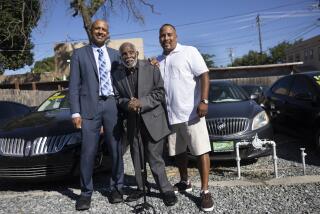High Court Upsets Death Sentence for Killer for 2nd Time
- Share via
SAN FRANCISCO — For the second time, the state Supreme Court on Thursday reversed the death sentence of the convicted murder-for-hire killer of a Modesto couple in 1978.
The justices held unanimously that Elbert Lee Easley, 48, is entitled to a third penalty trial for the fatal stabbings of Reiner and Sigrid Junghans in a plot in which Easley was paid $4,000 by a former business associate of Junghans to commit the crime.
Easley’s first death sentence was upheld in 1982, but the justices granted a rehearing and a year later struck down the sentence because jurors were told that they could not allow sympathy to affect their verdict. His conviction was upheld.
In a second penalty trial, Easley was again sentenced to death. But in Thursday’s ruling, the justices held that he did not receive a fair trial because of what they called the “clearest type” of conflict of interest by his defense attorney.
The justices noted that Easley’s court-appointed lawyer, Roger Hanson of Santa Ana, in a separate federal civil case had been representing a Nevada brothel owner who also was a key prosecution witness against Easley.
The brothel owner gave testimony in Easley’s case supporting a prosecution contention that Easley had once been hired to burn down the brothel--a contention that Hanson, as a defense attorney, was obligated to attack.
But in the federal case, the brothel owner Hanson represented was seeking damages from persons who allegedly hired Easley to set fire to the brothel--a contention that Hanson, as the plaintiff’s attorney, was obligated to support.
Easley apparently was not fully aware of the conflict and did not make a knowing and intelligent waiver of his right to a conflict-free lawyer--and thus was denied his right to effective assistance of counsel, the court said in an opinion by Chief Justice Malcolm M. Lucas.
“No one explained to (Easley) that Hanson owed a conflicting duty of loyalty to (the brothel owner) that could affect his ability to cross-examine (the brothel owner) and attack the prosecution’s arson evidence,” Lucas wrote.
Called ‘Too Eager’
The justices said the trial court had been “too eager” to accept Hanson’s assurance that any potential conflict could be avoided. Alex Reisman of San Francisco, the lawyer who represented Easley on appeal, said Thursday’s ruling “sends a very clear message to the trial courts that the Supreme Court is not going to accept form over substance.”
“Judges will have to make sure the record shows counsel and the trial court have informed the defendant of the nature of the conflict and its potential adverse effects,” he said.
State Deputy Atty. Gen. Gerald Engler expressed disappointment over the reversal of Easley’s sentence, noting that prosecutors had opposed Hanson’s appointment as Easley’s lawyer. “This is one of those situations where the prosecution did everything right, yet the result goes against it,” he said.
‘A Red Herring’
Hanson, the trial attorney, said he was “very glad” that the sentence was reversed, but called the conflict-of-interest issue “a red herring.” The testimony of the brothel owner, Walter Plankinton, was only a minor part of the case against Easley, he said.
“You could have taken him completely out of the case and it would have had zero effect,” Hanson said.
Easley was accused of accepting an offer by Joseph Penka to kill Reiner Junghans, his former business associate. Junghans’ wife apparently was killed because she was present on the day of the crime, authorities said. Penka was convicted and sentenced to life in prison for his role in the case.
The court now has reversed 13 death sentences in 50 capital cases decided since the defeat of Chief Justice Rose Elizabeth Bird and two others in the 1986 fall election.
In other action, the justices:
- Let stand a state Court of Appeal ruling that overturned a $47-million fraud award against the Bank of America to two Sonoma County apple-growing families who charged that the bank had failed to deliver promised financing for a processing plant, and thus forced them into bankruptcy.
More to Read
Sign up for Essential California
The most important California stories and recommendations in your inbox every morning.
You may occasionally receive promotional content from the Los Angeles Times.










